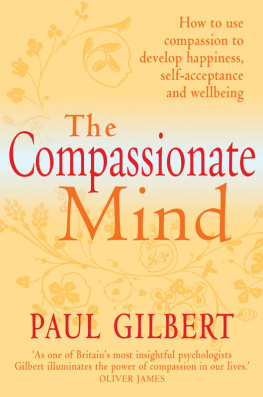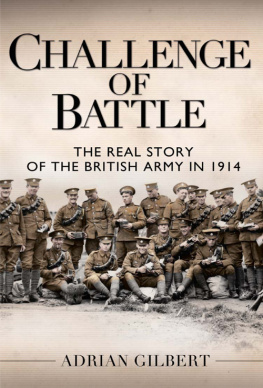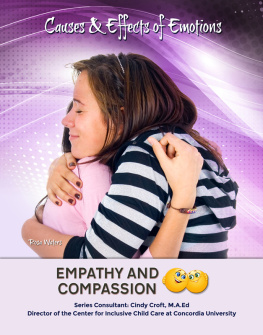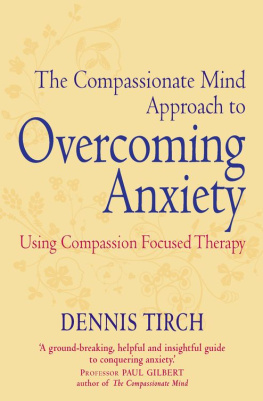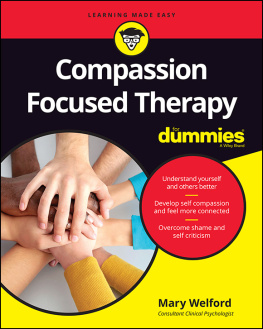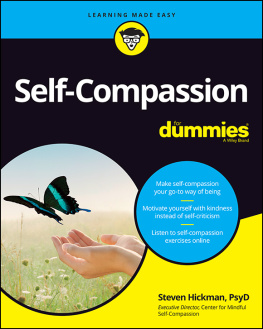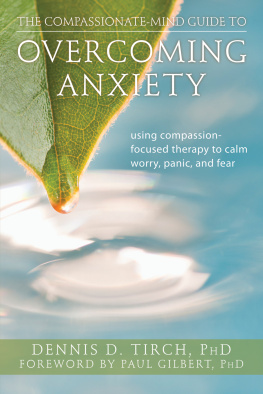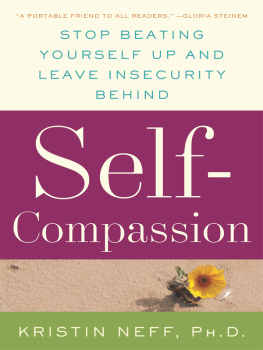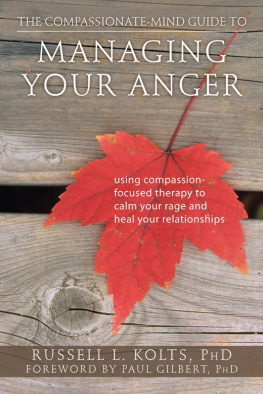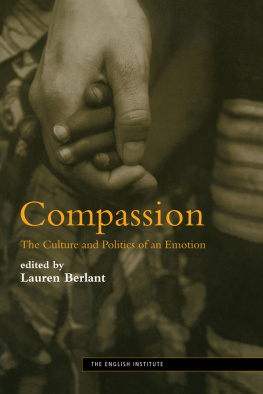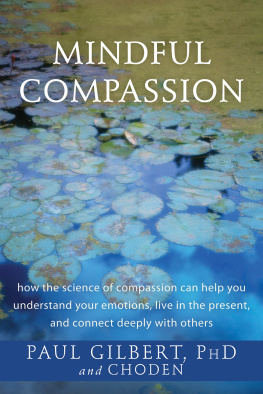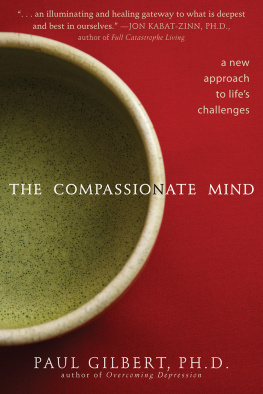Gilbert - The Compassionate Mind
Here you can read online Gilbert - The Compassionate Mind full text of the book (entire story) in english for free. Download pdf and epub, get meaning, cover and reviews about this ebook. year: 2009, publisher: Little, Brown Book Group, genre: Home and family. Description of the work, (preface) as well as reviews are available. Best literature library LitArk.com created for fans of good reading and offers a wide selection of genres:
Romance novel
Science fiction
Adventure
Detective
Science
History
Home and family
Prose
Art
Politics
Computer
Non-fiction
Religion
Business
Children
Humor
Choose a favorite category and find really read worthwhile books. Enjoy immersion in the world of imagination, feel the emotions of the characters or learn something new for yourself, make an fascinating discovery.
- Book:The Compassionate Mind
- Author:
- Publisher:Little, Brown Book Group
- Genre:
- Year:2009
- Rating:5 / 5
- Favourites:Add to favourites
- Your mark:
- 100
- 1
- 2
- 3
- 4
- 5
The Compassionate Mind: summary, description and annotation
We offer to read an annotation, description, summary or preface (depends on what the author of the book "The Compassionate Mind" wrote himself). If you haven't found the necessary information about the book — write in the comments, we will try to find it.
The Compassionate Mind — read online for free the complete book (whole text) full work
Below is the text of the book, divided by pages. System saving the place of the last page read, allows you to conveniently read the book "The Compassionate Mind" online for free, without having to search again every time where you left off. Put a bookmark, and you can go to the page where you finished reading at any time.
Font size:
Interval:
Bookmark:
Praise for The Compassionate Mind
Anyone who struggles with their inner critic should make sure to read this book. Professor Gilbert writes in a masterly fashion about compassionate mind training an innovative approach which is likely to grow in importance over the next decade as the evidence for its benefit continues to build.
David Veale, Institute of Psychiatry, Kings College London
Like so frequently in the past, Paul Gilbert has come forth again with a book about the mind, its unused potential, and how to harness that potential to ones and others benefit. The Compassionate Mind is a roadmap to compassion for the self and towards others. It is a book for those curious enough to explore their hidden potential to attain a special kind of humanness and happiness. A 10 on a scale of 1 to 10.
Michael McGuire, author of Darwinian Psychiatry
Internationally-renowned psychologist Paul Gilbert has provided all of us with a much-needed book. Written with wisdom and warmth, Gilbert takes us on a journey through the far reaches of evolution to the very depths of our own hearts. This helpful and thoughtful guide to living a compassionate life for yourself and for others will be a reminder for many of us that we are all human but that we need to be more humane toward our own troubled selves. Throughout this book the reader will feel like the author is speaking directly to him or her and will recognize that you can use the tools of modern psychology to fix what feels broken inside of us. A timely book for a time when competitiveness, materialism and narcissism have failed us. This book provides timeless wisdom that you can use every day. It will make a wonderful gift for someone you care for especially, if you give it to yourself.
Robert L. Leahy, author of The Worry Cure and President of the International Association for Cognitive Psychotherapy
Paul Gilbert is one of the most brilliant scientists studying compassion today. In this wonderful book, he makes his theories very accessible and down-to-earth. You feel like youre having a chat in his living-room with a warm cup of tea. I also love his easy-to-follow exercises, which offer concrete ways to help you develop greater compassion in daily life.
Kristin Neff, Associate Professor of Human Development, University of Texas at Austin
The increasing drive to find a competitive edge in all aspects of our lives may create efficiencies but they are cold, heartless and unpleasant to live with. Gilbert shows how and why this occurs, and explains why our capacity for compassion is the antidote.
Oliver James, author of Affluenza and The Selfish Capitalist
The Science behind Compassion
Building the Compassionate Self Skills and exercises
Im delighted to thank many people for all their contributions to this book. I must begin with the many patients whom Ive seen in psychotherapy over the past 30 years for their courage and insights into the difficulty they have in being compassionate to themselves and their efforts to become so. It was with them that the central idea that a lack of self-kindness and warmth is central to the many states of mental suffering took root.
We have sought to research this in some detail in particular, with regard to issues linked to shame and self-criticism. Here I would like to thank my research colleague Chris Irons who, over many years, worked on various models of compassion with me. Im also delighted to thank enthusiastically my current, wonderful research team of research coordinator Corrine Gale and researcher and data analyser Kirsten McEwan. They work fantastically hard and with dedication. Special thanks, too, go to Helen Rockliffe for her enthusiasm and hard work while with us. My secretaries Diane Woollands over many years (now retired sorry if I wore you out) and recently Sue Branningan and Lesley Fulter offered excellent support with proof-reading and reference checking. Special thanks also go to Keith Wilshere for his masterly management of our research unit, for keeping us all afloat and getting me back into guitar playing and recording with Still Minds.
In 2007, I set up a charity to advance research and therapy work in compassion the Compassionate Mind Foundation ( www.compassionatemind.co.uk ). Its a pleasure, therefore, to thank the current trustees: Jean Gilbert and Drs Chris Gillespie and Tom Schroder. Thanks also to our board members Diane Woollands (who is also the charitys coordinator) and Drs Ken Goss, Deborah Lee, Mary Welford, Ian Lowens and Chris Irons. All of them have worked on these ideas for a number of years and have developed compassion-focused therapy in their own domains, covering eating disorders, anxiety, trauma and psychosis. Im also indebted to clinical colleagues Sue Procter and Drs Sophie Mayhew, Sharon Pallant and Andrew Rayner with whom Ive worked clinically and on developing outcome data for compassion-focused therapy. Thanks to the staff of the day centre at 63 Duffield Road for their continuing work with compassion-focused therapy and for making available facilities for our regular fortnightly supervision groups a source of passion and a space in which to share ideas and research findings. Michael Townend and Louis Spry at the University of Derby have been highly supportive and helpful in moving training forward, and we hope to develop a structured training shortly.
I would also like to offer my thanks to my friend Professor Meinrad Perrez for offering me over many years the visiting professorship at Fribourg University in Switzerland, and for sharing his fascinating work on emotion regulation in families. Thanks also to my friend Professor Jose Gouveia of the University of Coimbra in Portugal, for again offering me a visiting professorship; and for stimulating important research in shame and compassion; thanks too to his students Paula Castilho, Marcella Matos and Alexandra Dinis. Special thanks also to Dr Giovanni Liotti for, over the years, his insights and work on attachment theory and therapy and guidance. Im also indebted to various mentors at various times, including Dr John Price and Professor Leon Sloman who developed the social rank theory of mood disorder, Dr Anthony Stevens for his guidance on archetype theory, and Professors Michael McGuire and Dan Wilson for their considerable knowledge on evolutionary approaches to mental disorder.
Next pageFont size:
Interval:
Bookmark:
Similar books «The Compassionate Mind»
Look at similar books to The Compassionate Mind. We have selected literature similar in name and meaning in the hope of providing readers with more options to find new, interesting, not yet read works.
Discussion, reviews of the book The Compassionate Mind and just readers' own opinions. Leave your comments, write what you think about the work, its meaning or the main characters. Specify what exactly you liked and what you didn't like, and why you think so.

